Welcome to A Wild Green Heart. Make your favourite beverage. Sit yourself down. Notice the tangible sense of being in your body. Take a few deep, slow breaths, in through your nose, down into your belly, and out even slower through your mouth. There. It's good to have you here.
I mentioned last week - when I described times Fox Walking at Pomona - that I was going to write some more about my learning and practices of going slow. And, seeing as we're well and truly entering the long dark of winter here in the UK, where the plants and creatures around us are slowing, dying, resting, hibernating and generally hunkering down, I figured it was a good time to dig deeper into thoughts and practices for going slow.
I'm going to address both why we need to slow down, and suggest some practical suggestions for how to do it. No need to strap in - we'll be taking it nice and slow!
So, why is slowing down such an important practice? I'm guessing that most readers already have a strong personal answer to that. If so, I'd love to hear about them in the comments! Maybe you don't feel any great desire to slow the pace of your life, or you don't think it's important. I'd love to hear about that perspective too.
So, Why Slow Down?
However you feel about it, the reality is that our society's continual, year-round, intense level of human activity is distinctly at odds with what's happening in the beyond-human realm at this time of year in the Northern hemisphere. It's also at odds with the pace and cycles of living that our ancestors would have been familiar with for many thousands of years. The necessity for people to keep going constantly, consistently, in order to perpetuate the machinery of our consumerist systems is a behavioural outlier, whichever way you look at it. Our “normal” is distinctly abnormal.
Here's the philosopher, Yoruba poet, public intellectual and author, Báyò Akómoláfé
In the image are some of his most frequently quoted words:
The times are urgent, let us slow down
I believe we can all sense the deep, counter-intuitive wisdom in this phrase at an instinctual level. But what does he mean? Here's Báyò expanding a little on the notion of slowing down in the face of the multiple crises of our times:
"To ‘slow down’ … seems like the wrong thing to do when there’s fire on the mountain. But here’s the point: in ‘hurrying up’ all the time, we often lose sight of the abundance of resources that might help us meet today’s most challenging crises. We rush through the same patterns we are used to. Of course, there isn’t a single way to respond to a crisis; there is no universally correct way. However the call to slow down works to bring us face to face with the invisible, the hidden, the unremarked, the yet-to-be-resolved....
The idea of slowing down is not about getting answers, it is about questioning our questions. It is about staying in the places that are haunted."
- Báyò Akómoláfé - “A Slower Urgency” (blog post)
In other words, the pace at which we have been conditioned to live causes us to miss a great deal that is right in front of us. Things that might just prove essential if we want our Home and our species to survive and flourish. Our human-centric lives cause us to overlook so many connections and resources that our ancestors knew all about. Re-weaving those connections takes genuine time and attention, and the determination to connect at a much deeper level with beings that we often ignore or write off as “useless.”
Even as I take my first, faltering steps in re-membering the relations and medicines of many of my plant and animal kin, I carry a deep grief at the complete absence of inherited ancestral knowledge on this front. I believe I will always carry that grief. I believe that tending to that grief is another vital element of going slow.
The usual context for Báyò’s writing is the polycrisis facing our planet - climate change, biodiversity loss, mass extinctions, rising ocean temperatures and so on. The dominant narrative for tackling these issues has long been a technological one. Many humans in the global north seem to believe that developing new technologies - the very thing that has got our planet into these predicaments - will help us find our way out. But dig a little deeper, and it is clear that most of these technologies are simply proposing new ways to keep on living exactly the way we have been accustomed to in the modern west. What is needed is a radically different approach to lifestyle and to determining human needs - one that is equitable on a global level.
Slowing down, from this perspective, is not so much a question of pace, as one of attentiveness, as he says here:
There are so many reasons why we should slow down. The pace we are accustomed to living at is harming our own bodies as deeply as it is harming the greater body of Earth. You may or may not hold the same convictions. But my own body, along with those of many good friends, seems to demonstrate just how damaging it is to live at the frenetic pace demanded of us by the capitalist systems of our day.
There are myriad ways that our own bodies, especially those of us with chronic and incurable illnesses (many folk I know seem to be developing all kinds of new, complex symptoms, and devastating combinations of illnesses) seem to mirror the unbearable devastations perpetrated against Mother Earth. Her symptoms and our symptoms alike, speak to ways of living that are out of balance, extractive, lacking limits, and deeply damaging.
There's plenty more to be said about that. I'm aware I've barely touched on the unfathomable human and environmental cost being mostly paid by those in the global south, for the greedy ways of life driven by the systems of the global north. I feel like so many others have made this point much more eloquently than I feel able to right now. Perhaps I'll return to this matter again in another post.
So, how do we begin to slow down? How on earth do we begin to escape the crushing grip of the capitalist death machine and find a more creaturely pace to live at, while there are bills to pay and mouths to feed?
This is not something that happens easily - I'm against the very idea of quick fixes - and I trust you can hear the inherent contradiction in the notion that we might learn to slow down promptly! So, if this is something you wish to lean into, I would encourage you first and foremost to be patient and gentle with yourself. Slowness is not something that the systems we live and work within are ever going to support us to do!
My own painfully slow learning journey
Slowness was certainly not something that I embraced easily. It has been the strange gift of circumstances I wouldn't have chosen: a chronic illness and a lifetime of compounded trauma. I have only very gradually allowed myself to be taught by my body and by the more-than-human world, and it didn't happen without a fight! Part of my reason for writing this post is to encourage people to move towards more sustainable modes of living without having to experience the horrific cost that I've paid in my body. Here's some context.
My first bout of post-viral fatigue hit me in late summer 2017, and lasted three months. I was horrified by this new experience of a lack of energy that, at the time, seemed to go on interminably. Eventually, though, it subsided, and my desire was to return to doing all the things I had done before.
But each time I started “getting back to normal life” I would soon enough run into another period of deep fatigue. Within a year it was becoming my normative state, and by the end of 2018 I had a diagnosis of ME/chronic fatigue syndrome. This was the very thing I had secretly feared most since first hearing about ME as a teenager, and it had become my ongoing daily reality.
During these early months I had by necessity stopped doing many things entirely. These included: my regular long distance runs, my weekly games of five-a-side, my frequent swims and cycles, my post-work drinks with friends, my evenings out, and my super-early commutes to work that gave me an hour writing poetry in a coffee shop every morning. All of these activities had been sources of great pleasure, and I felt like I'd given my whole life up. But in all honesty, I had barely begun the necessary and valuable work of Slowing The Fuck Down.
SLOW sticker by the author
I have a vivid memory from 2018 of walking across town between work venues with a good friend and colleague, who commented part way that I “didn't walk like someone with chronic fatigue.” We were going somewhat faster than his usual walking pace! This comment elicited a complex range of emotions in me - from feeling offended and somewhat gaslit, to bewilderment, to realising just how much I was still pushing my body at every opportunity that fell within the bounds of “stuff that's still allowed and still possible.” It was a telling moment.
Even in a desperately unwell body , it took me years to finally take slow seriously. It was probably late 2020 or early 2021 by the time I started to do so. By that time a good many other aspects of my life had also begun to fall apart.
Slow Down public health message, 2021
I recently rummaged around in the depths of Instagram and found the first time I penned something public about going slow, back in spring 2021, at more or less the same time as leaving the message in the photo above. Here it is:
The practice of Slowness as an act of self-care and self-love is radically underrated and underused. It is also deafeningly opposed by our Western neoliberal culture, making it also a sacred act of resistance and a declaration of life in the face of the all-pervasive scream to be useful, to produce, to be efficient. This makes Slowing Down increasingly hard to learn and to enact.
Counter-intuitively, it is this very practice of Slowness which can deepen us to a place where we are more useful and more effective than ever, in very specific ways. However, self-improvement for the sake of upholding the status quo should never be our motivation, for it undoes the very thing we seek to achieve.
Going Slow is for yourself and for your fellow creatures. It is a stand against all systems of oppression and inequality.
I'm struck by the confidence with which I stated this. I believe wholeheartedly in what I wrote, but it seems to sweep over the long and painful process that I had undergone in the previous 3½ years, and which I am still working through. I'm seeking to address that by what I've written here. We are all deeply and convincingly conditioned to be fast, to be productive, and to resist the very things that slow us down and support our nervous systems. Like all worthwhile change, it takes time and practice to outwork.
I was going to continue this post with a few suggestions about how we can practice going slow. But, having already written a lot, I'm going to take my own medicine, and save that for next week.
For now, I'll leave you with a poem by the wonderful John O'Donohue. As a helpful step towards slowness, see if you can read it aloud at half your usual speed:
Time to be Slow
This is the time to be slow,
lie low to the wall
until the bitter weather passes.
Try, as best you can, not to let
the wire brush of doubt
scrape from your heart
all sense of yourself
and your hesitant light.
If you remain generous,
time will come good;
and you will find your feet
again on fresh pastures of promise,
where the air will be kind
and blushed with beginning.
- John O’DonohueBefore you leave and get on with your day, why not take a moment to notice your body once again. How does it feel to have paused, to have read a poem slowly? How are you breathing? What emotions are present? Is there anything else you can give to yourself, to create a little more ease today?
As always, I'd love to hear your thoughts and reflections on this post.
Thanks for dropping by, and I hope to connect with you here next week, when I shall outline some of the practices that have best supported me in moving towards a life-sustaining pace.

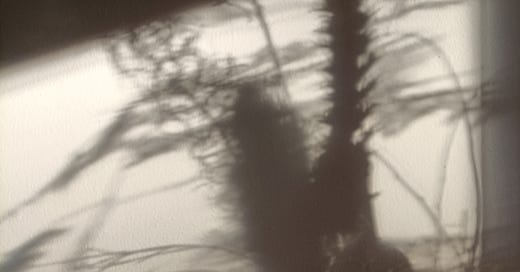
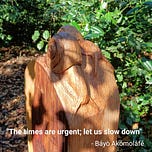




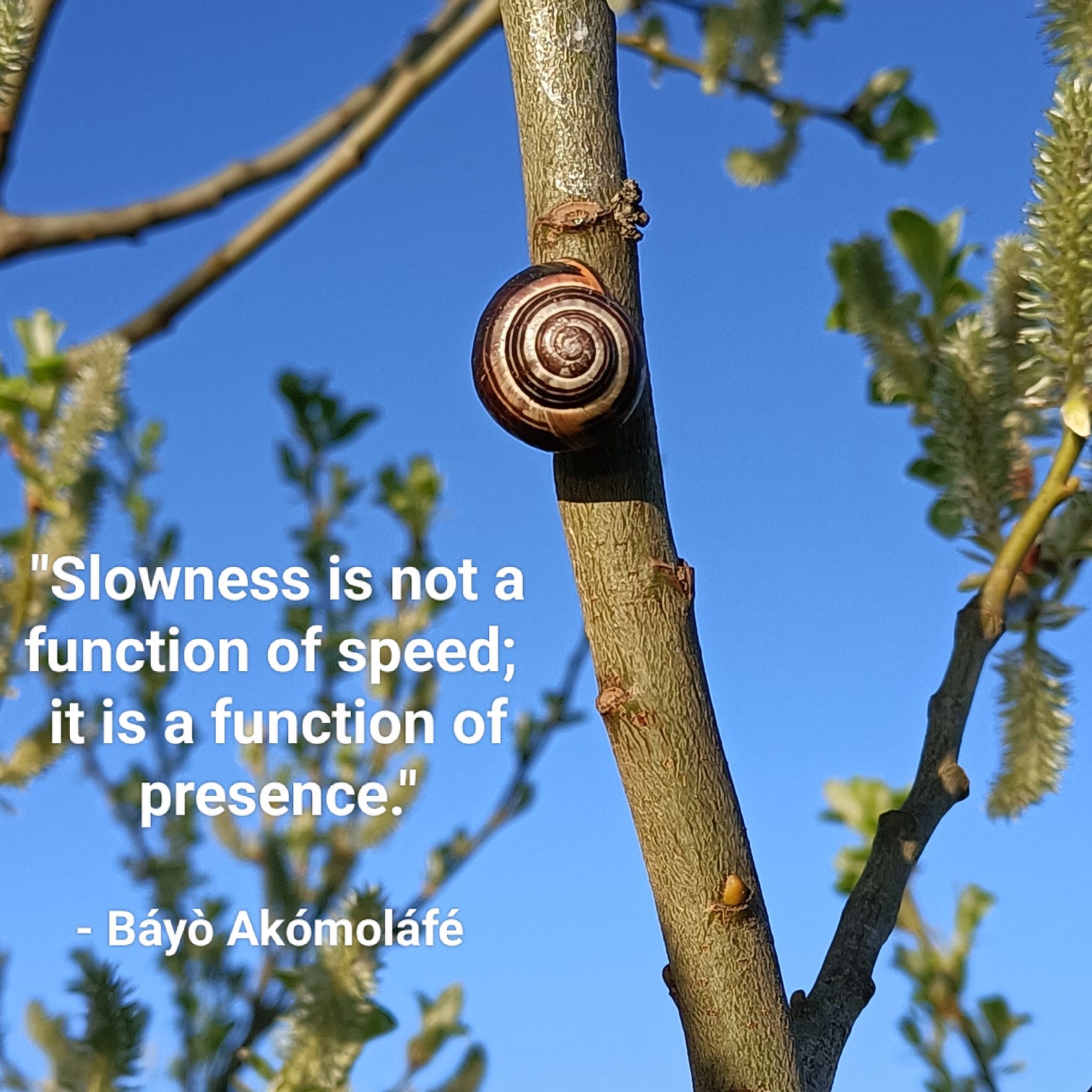
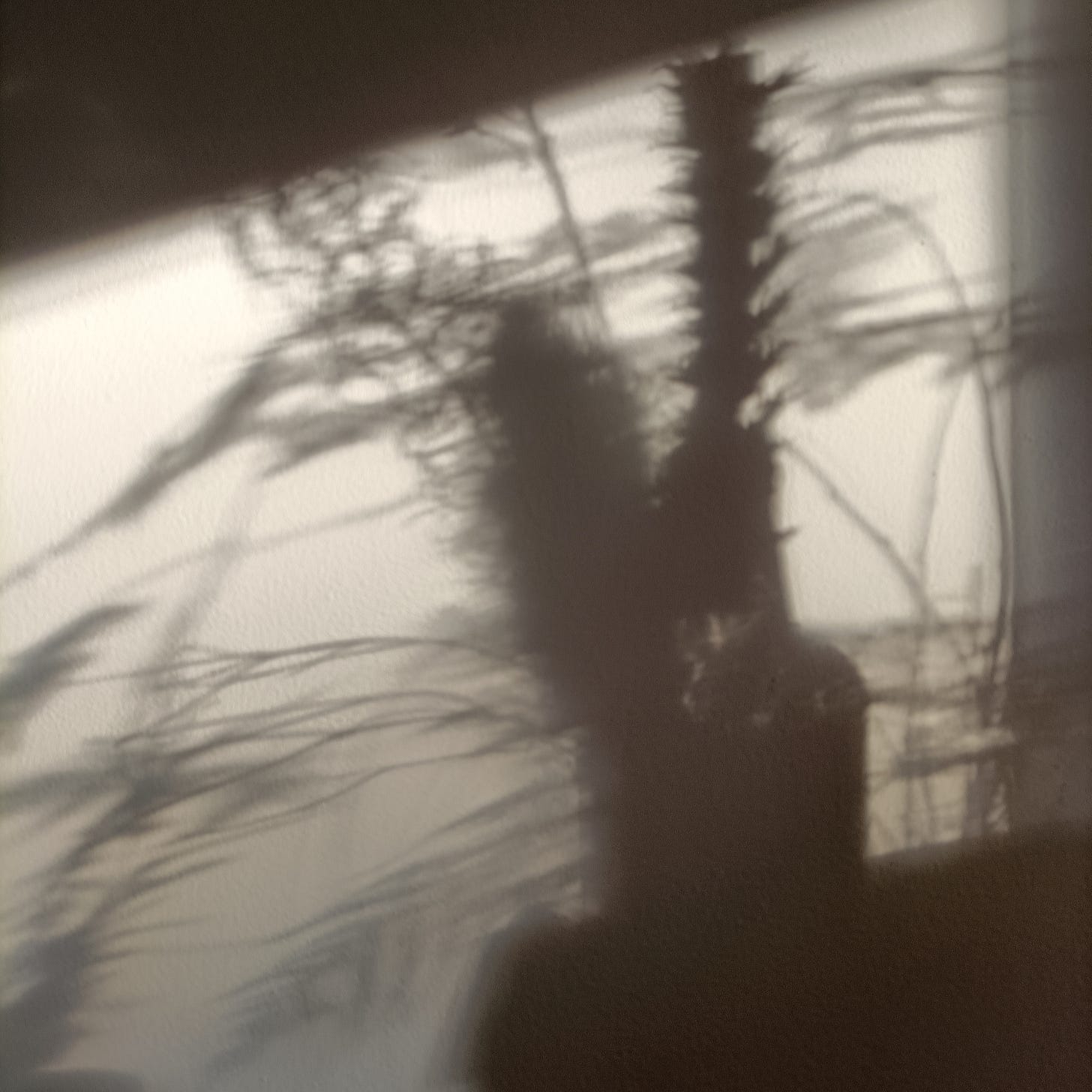

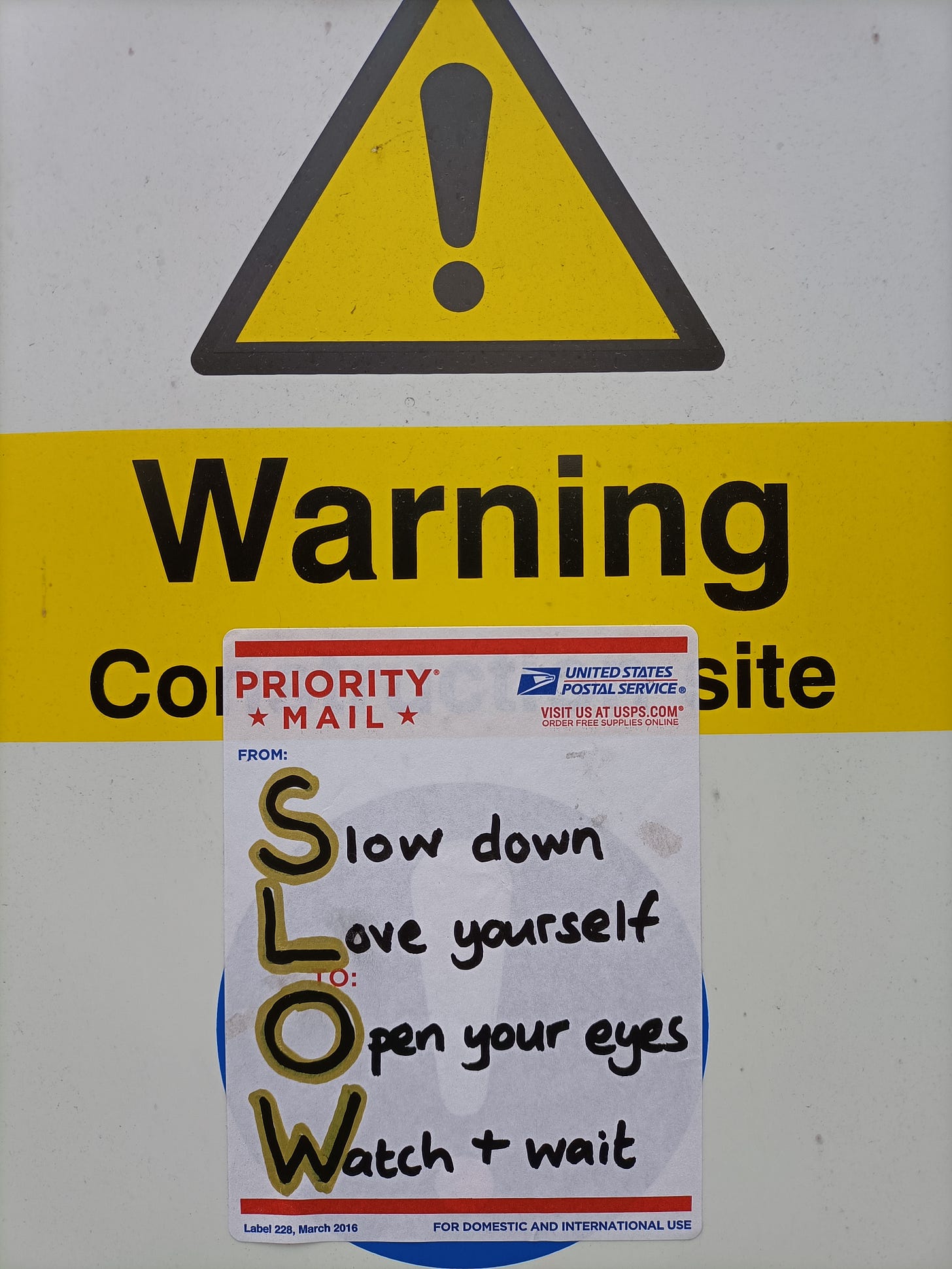
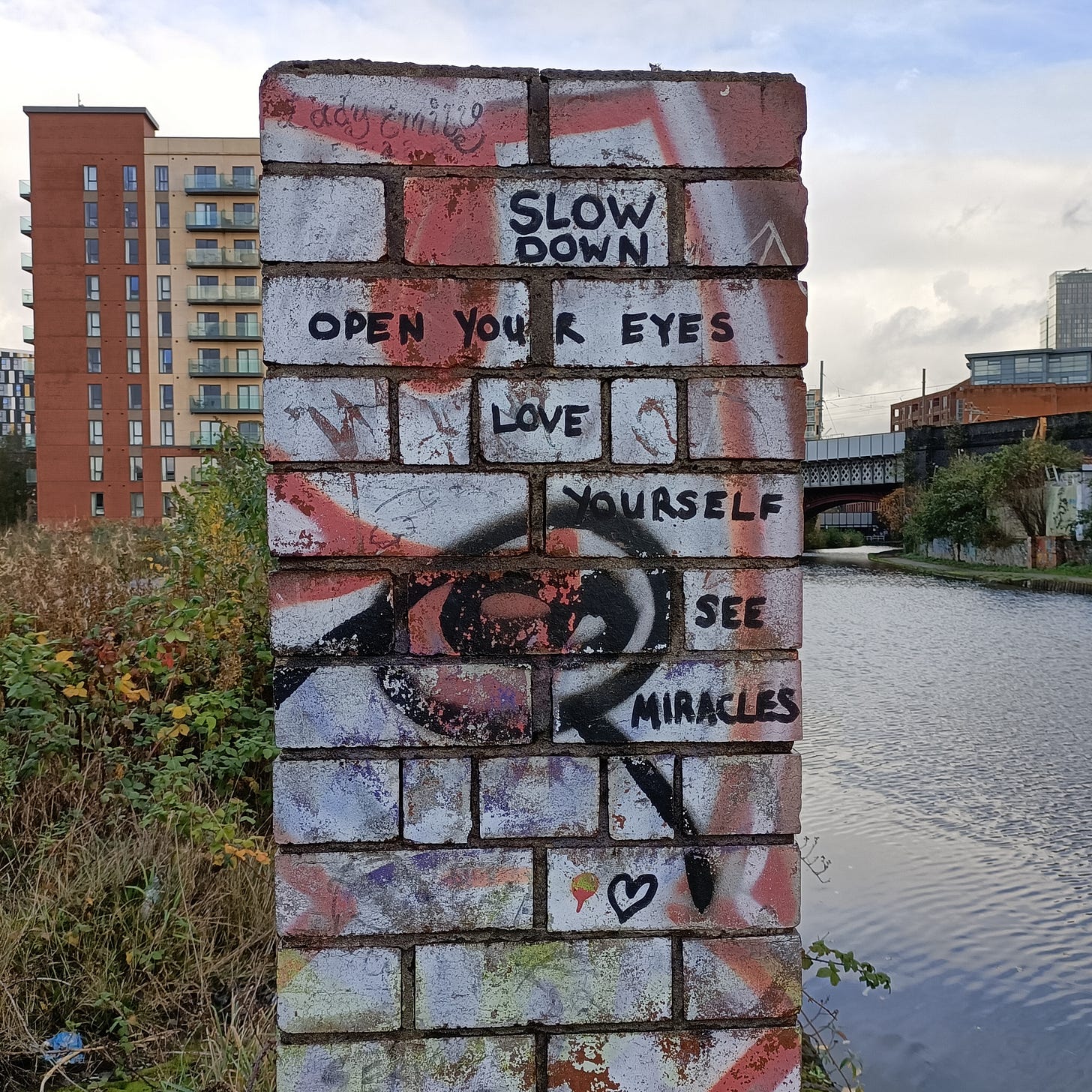









Share this post